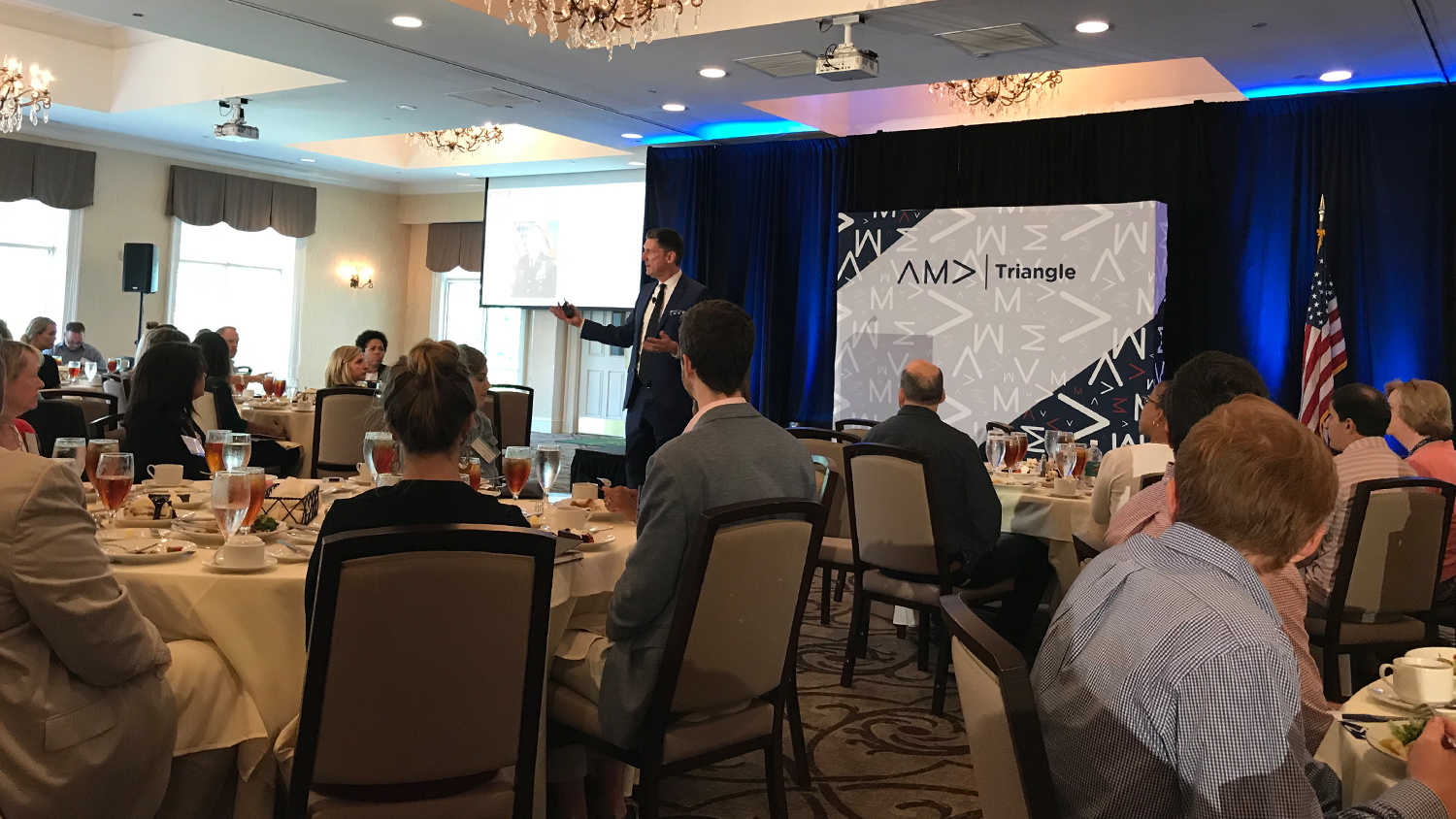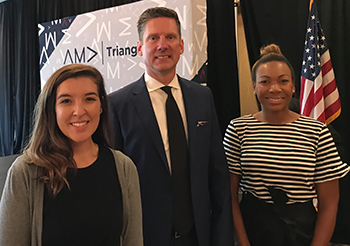Understanding Teamwork: Remember the “I’s” – the Individuals on Your Team

AMA Triangle’s September 20 luncheon speaker was a bit out of the ordinary for the professional marketing association, yet it focused on a topic that’s integral to every marketer’s day – teamwork.
The AMA Triangle’s guest speaker that day was Bradley Kirkman, head of the NC State Poole College of Management’s Department of Management, Innovation and Entrepreneurship and H. Hugh Shelton (Ret.) Distinguished Professor of Leadership, and an expert on teamwork.
Kirkman shared a few takeaways from his own experience in leadership roles, as well as key points from “3D Team Leadership: A New Approach for Complex Team,” a 2017 book he co-authored with T. Brad Harris, assistant professor at Texas Christian University.

“I think every industry should take the time to learn and educate themselves on the importance of teams and leadership, especially in our ever-changing business world,” said Ashley Nuzum, marketing manager at PrecisionLender and director of luncheons for the AMA Triangle chapter, via an email interview with Poole College communications after the event. She also is a candidate in the college’s Jenkins MBA professional evening program.
“With more and more cross-functional teams that work remotely from all over the world, understanding how to optimize your role within a team and how to lead these teams is critical, no matter what industry you’re in,” she said.
“I’ve heard Professor Kirkman speak a few times now and I always find it to be a powerful reminder that you need to focus on the ‘I’s on your team. So often you hear leaders say ‘Be a team player’, ‘We need to function as a team,’ et cetera. And while these may be true, it’s important to remember that you have individuals on your team that have their own objectives (and) goals,” she said.
“The other item that I find interesting is the different cultural perspectives Professor Kirkman mentions,” she said, citing in particular a family metaphor that Kirkman has mentioned when working with teams in the Philippines. “As our teams in business become not just more cross-functional, but international, it’s important to remember each person’s personal cultural backgrounds, as it could make a tremendous difference when it comes to their participation on a team,” she said.
For Ali Nailor, a recent NC State graduate, this was her first AMA luncheon. “I was excited to see a speaker from the NC State faculty,” she said. “Because teams are such a huge part of marketing activities in today’s environment, I was interested to see what he would share. I wanted to hear about the challenges teams face and solutions available from an expert in the field,” she said.
A few key takeaways for her:
- A well-designed team can do well even with poor coaching, but even excellent coaching can’t lead a poorly designed team to success.
- Focus is vital for effective teamwork, whether it is focus on the individual, the entire team, or subgroups within an overall team, depending on the situation and current need.
“I definitely think I will carry what I learned from this presentation with me as I go into the business world, especially the takeaways mentioned above. I think it will be useful to incorporate that knowledge in teams I have the opportunity to lead or be a member of in the future, and to give me a correct attitude and perspective going into those situations,” she said.
Kirkman was one of Tracy Russell-Belk’s professors when she was in the Jenkins MBA program and its McLauchlan Leadership Series. She said, “His message really resonated with me (and another AMA member who was attending the luncheon with her),” adding, “Who doesn’t work on teams in their marketing role? It’s so cross-functional.”
Melissa Hall, who recently joined the AMA Triangle chapter, said that a key takeaway for her was, “The design of the team is more important than the coaching, and the most important thing about diversity is cognitive diversity.” She also said that, as she is exploring employment options, she will be “looking at how the organization works with teams before I join a company.”
In his book and his presentation, Kirkman also made a distinction between teams and groups. This distinction is particularly important when considering compensation-based goals.
“A team is typically defined as an interdependent collection of individuals who are mutually accountable and share responsibility for specific outcomes for their company (and) exchange the ‘stuff’ with which they work” – information, materials, ideas, he said
Teams “have high levels of coordination and integration, and high degrees of collaboration to get work done.” Their members are accountable to one another, and as a team, to their company. This kind of interdependence can make it difficult to untangle who contributed what to the outcome of the team’s work, which makes it difficult to set compensation based on individual effort within a team effort.
“Groups are typically defined as people who learn from one another and share ideas but are otherwise not interdependent or working toward a shared goal,” he states.
His key point here is that groups have low levels of interdependence, little shared responsibility or accountability, and individuals – not entire teams – are delivering a product, service, idea or decision. … they do not rely on one another to complete their work. So, leaders should feel comfortable focusing more of their attention on the I’s in the group, he said.
Deciding whether to structure work around teams or groups depends on what type of structure is better suited to the tasks. For highly interdependent work, a team is often the better choice. For more independent work, groups often surpass teams in performance, he said.


